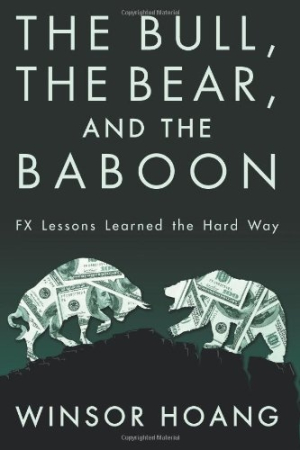The Bull, The Bear, and The Baboon
FX Lessons Learned the Hard Way
Through seven protagonists, Winsor Hoang shows the intertwining roles of lust, greed, self-image, and social aspiration in the financial markets.
These dramatic narratives of seven highly different individuals who turn to a currency trading seminar for financial gain and self-fulfillment reveal as much about human emotional needs as they do about the arcane working of the markets. The Bull, The Bear, and The Baboon is an unusual hybrid of trading primer, psychological study of human behavior, and financial soap opera. Winsor Hoang is ambitious in taking on so much in one volume, yet he succeeds in holding reader interest and imparting a great deal of knowledge about the volatile world of currency trading as he does so.
The loosening of regulations in recent years has meant individuals can trade foreign currencies with modest starting capital stakes of less than $1,000. Moreover, many brokerage firms will grant leverage of four hundred or five hundred to one—meaning for a grand, you can trade with half a million dollars. As more small-time traders pile into this market, a breed of opportunistic “educators” running profitable seminars have encouraged the trend with glib promises of easy money to be made for just about anybody who cares to join the party.
Except, as Hoang outlines in this complex tale of seven individuals who all tried to make it in currency trading, there is very little science—and a lot of skulduggery—in this market. The protagonists (all students at the same “day-trade your way to fortune” course) range from a successful fast-food mogul who feels stuck in a staid marriage and steady routine to a failed stockbroker seeking to recapture the trappings of his vanished luxury lifestyle.
Hoang uses the characters’ highs and lows to illustrate common pitfalls in currency trading. Readers who take the time to immerse themselves in the intricate backstories will be rewarded with a glimpse into the intertwining roles of lust, greed, self-image, and social aspiration in the financial markets.
As well as looking out for the bullish upswings and bear-like declines, Joe Public ought to be wary of the “baboons,” Hoang’s term for the amoral brokerage firms that hoodwink naïve traders through commissions and dubious practices such as delaying trades by crucial split seconds or taking opposing positions for their own gain.
With twenty years and more than twenty thousand hours of trading, Hoang has seen firsthand how consistently inconsistent and irrational the currency markets can be. He dispels the overreliance on past statistics and esoteric indicators, such as Japenese candlesticks or Fibonacci numbers and chart patterns. As the ubiquitous disclaimer warns, “past performance does not guarantee future results.”
At its best, this work hints at the moralistic financial tales of Balzac and Dickens, yet in its lower moments has occasional elements of daytime soap opera, with overblown descriptions of lithe, tanned bodies and sex in five-star hotel suites. However, the overall mix is compelling, informative, and a first-rate page-turner.
Reviewed by
Seamus Mullarkey
Disclosure: This article is not an endorsement, but a review. The publisher of this book provided free copies of the book and paid a small fee to have their book reviewed by a professional reviewer. Foreword Reviews and Clarion Reviews make no guarantee that the publisher will receive a positive review. Foreword Magazine, Inc. is disclosing this in accordance with the Federal Trade Commission’s 16 CFR, Part 255.

